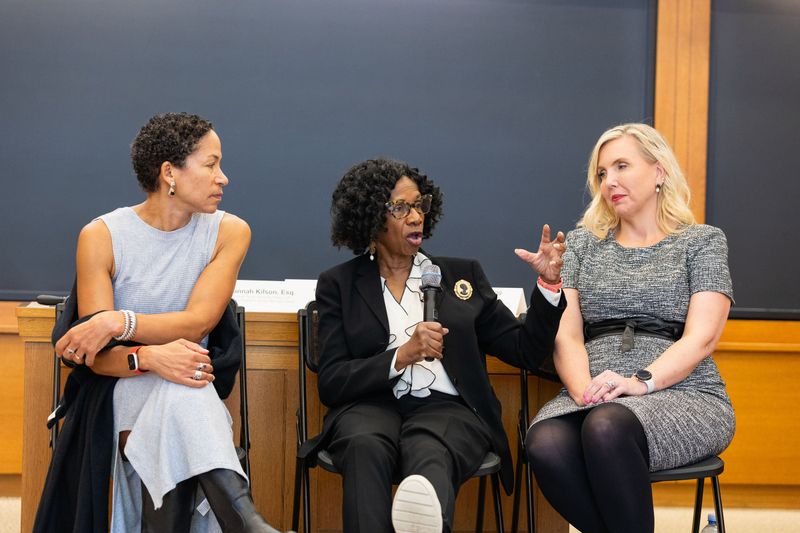17 Phrases Women Say After They Stop Caring About Being Nice & Start Being Honest
There’s a pivotal moment when a woman decides that her comfort and truth are more important than the comfort of others.
She stops sugarcoating her words, an act of self-liberation and empowerment. The transition is marked not by rebellion but by a profound embrace of authenticity.
As women step into this space, they start saying what they really mean—without fear or filter.
1. That doesn’t work for me.

A clear boundary is set with these words. No apologies, just a firm statement that places self-awareness at the forefront. This phrase acknowledges personal limits while inviting respect from others. It’s not about being difficult but about honoring one’s own needs and capacity.
This shift from accommodating to asserting transforms interactions, fostering genuine respect. It’s a declaration that the old ways of people-pleasing are over.
2. I’m not going to explain myself again.

Repetition can be exhausting, especially when explanations fall on deaf ears. This phrase is about ending the cycle of unnecessary justification. It signifies that the listener has had ample opportunity to understand, and further explanation is unwarranted.
This isn’t an act of defiance, but a reclamation of energy. Communicating once is enough; beyond that, it becomes a waste of precious time and resources.
3. That’s not my responsibility.

Owning what’s hers and letting go of what’s not. This phrase dismantles the myth that women must bear the burden of others’ responsibilities. It’s a statement that encourages personal accountability in the workplace and beyond.
By acknowledging the limits of her role, she not only lightens her load but also empowers others to step up. It creates space for more meaningful contributions and personal growth.
4. You don’t get to speak to me that way.

Respect is non-negotiable. This phrase sets the tone for how she demands to be treated. By confronting disrespect head-on, she draws a line in the sand, teaching others to communicate with decency and consideration.
It’s about establishing a culture of mutual respect, where abusive or dismissive language is firmly challenged and corrected. Her voice is powerful, and she ensures it’s heard.
5. No, and I don’t owe you a reason.

‘No’ is a complete sentence. This phrase liberates her from the obligation to justify her choices. It affirms that her decisions do not need external validation or explanation.
There’s strength in this simplicity, a quiet confidence that her ‘no’ is enough. This unapologetic stance opens doors to personal freedom and preserves her peace, reminding herself and others that her reasons are her own.
6. I’m not interested in pretending everything’s fine.

The facade of niceness is gone. This phrase unveils truth in its raw form, dismissing superficial pleasantries for genuine dialogue. It’s about embracing reality, even when it’s uncomfortable.
By rejecting pretense, she invites deeper, more authentic connections. The willingness to confront real issues is liberating, breaking the chains of false smiles and unspoken grievances.
7. If you keep interrupting me, we’re done talking.

Interruptions are barriers to communication, and this phrase addresses them with clarity. It’s a demand for respect in conversation, ensuring her voice is valued and heard. Silence isn’t an option when she’s being dismissed.
By setting this boundary, she cultivates an environment where dialogue is reciprocal, fostering understanding instead of dominance.
8. I heard you—I’m just not changing my mind.

Acknowledgment without acquiescence. This phrase communicates that while she’s open to listening, her convictions remain unchanged. It’s not about stubbornness but about staying true to personal values.
Listening doesn’t always necessitate agreement, and she stands by her decisions. This balance of open-mindedness and firm resolve defines her interactions.
9. You don’t have to agree with me, but I’m still right.

Confidence in one’s own truth is key. This phrase isn’t about arrogance; it’s about trust in personal judgment. She respects differing opinions but remains steadfast in her beliefs. This assurance doesn’t negate others’ perspectives but affirms her understanding of the situation.
Her confidence inspires others to also trust in their truths, creating a dynamic of mutual respect and authenticity.
10. I’m not staying where I’m not respected.

Respect is foundational, and its absence is intolerable. This phrase signifies a commitment to self-respect over complacency. When faced with environments that undermine her worth, she chooses to walk away.
It’s a powerful action that prioritizes dignity over acceptance, setting a precedent for others to value themselves. Her departure is a statement that respect is non-negotiable.
11. This conversation is over.

There’s power in knowing when to walk away. This phrase signifies closure, asserting control over her time and energy.
By concluding conversations that go nowhere, she reclaims her focus. It’s a reminder that she’s not obligated to indulge in endless discussions. This decisive end is liberating, freeing her to invest in more productive and positive interactions.
12. I don’t accept that apology.

Not every apology deserves acceptance. This phrase is about discernment, recognizing when apologies are insincere or manipulative. She values genuine remorse and change over hollow words. By refusing to accept empty apologies, she holds others accountable, fostering sincerity in interactions.
This discernment is empowering, filtering out superficial amends in favor of meaningful reconciliation.
13. Being uncomfortable doesn’t mean I’m being rude.

Honesty can be unsettling but isn’t inherently impolite. This phrase separates discomfort from discourtesy, defending truthful expression. She navigates conversations with integrity, even when faced with friction.
Embracing discomfort as part of honest dialogue promotes growth and understanding. Her courage to speak truthfully invites others to engage more openly, reshaping conversations for authenticity.
14. I’m not available for emotional clean-up anymore.

Emotional labor can be draining, and she’s done shouldering others’ burdens. This phrase liberates her from the role of emotional caretaker. It’s a declaration of independence, prioritizing her emotional well-being over the demands of others.
By stepping back, she encourages self-reliance and maturity in those around her. Her well-being takes precedence, fostering healthier dynamics.
15. That sounds like a you problem.

Clear boundaries are key to maintaining peace of mind. This phrase shifts responsibility back to the rightful owner of the problem. It’s not dismissive but rather a reminder that she’s not responsible for fixing everyone’s issues.
This clarity encourages others to take accountability for their challenges. Her focus remains on her own path, unburdened by the weight of unnecessary troubles.
16. You’re projecting—don’t confuse that with honesty.

Projection can cloud judgment, and she’s quick to call it out. This phrase distinguishes between genuine honesty and misplaced emotions. By identifying projection, she clarifies misunderstandings, promoting clear communication.
It’s about maintaining transparency, ensuring that interactions are based on truth rather than distorted perceptions. Her insights pave the way for more meaningful connections.
17. I’d rather be misunderstood than manipulated.

Integrity over acceptance defines her choice. This phrase prioritizes authenticity over the fear of being misinterpreted. She values truthfulness, even if it leads to misunderstanding, over compromising her principles.
Her commitment to honesty fosters genuine relationships grounded in trust, not deceit. This stance empowers her to navigate life with clarity and purpose, free from the constraints of manipulation.







